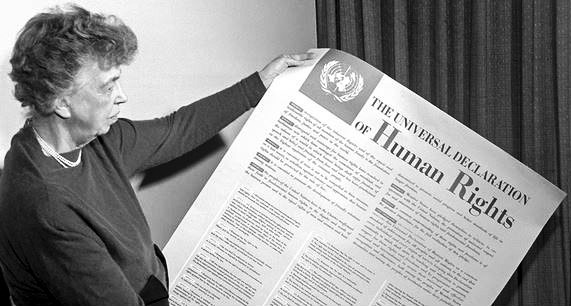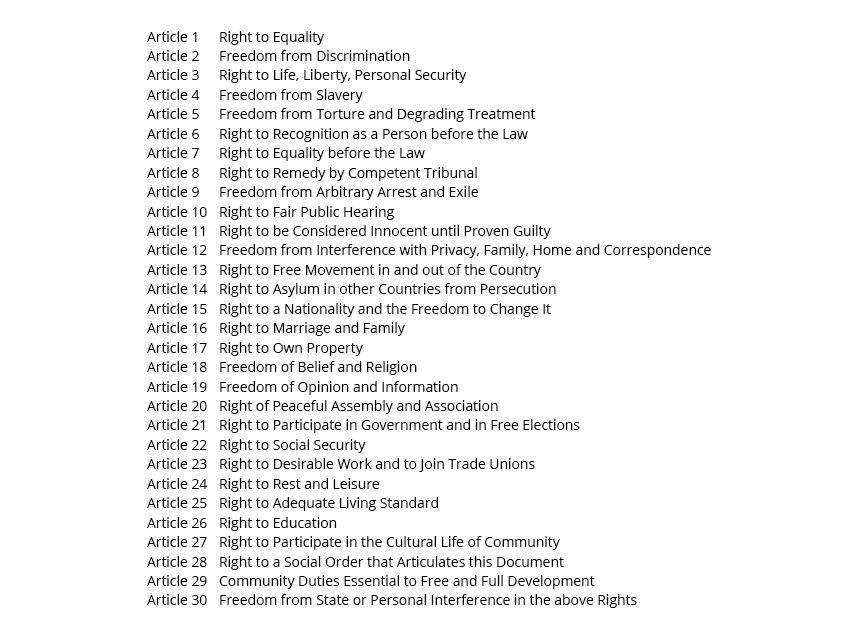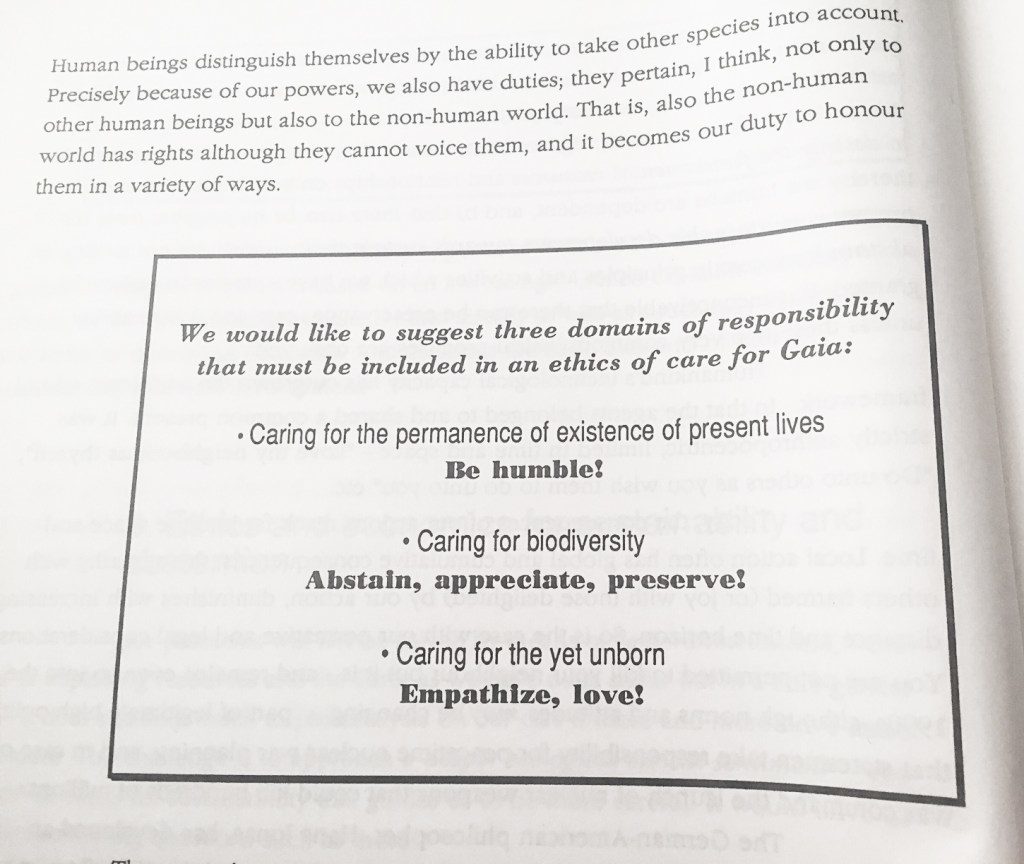At 70: A Few Problems with the Human Rights Concept
TRANSCEND MEMBERS, 17 Dec 2018
Jan Oberg | The Transnational – TRANSCEND Media Service
10 Dec 2018 – Today the Universal Declaration of Human Rights turns 70. All reason to celebrate. Without the norms embedded in this extremely important document, humankind would be much worse off.
Because normativity is important even though it is only words. It enables us to make those who violate human rights accountable. And that is, in general terms, an extremely important aspect of the UN and its Charter.
So too the norm expressed in its Article 1 – that peace shall be established by peaceful means and only when all such means have been tried an found in vain, can the UN member states take to violent means. As a last resort.
That said, the only two problems I have with the human rights philosophy and concept are:
- The word “human” – the implicit idea that only humans have right, not all the other creatures on earth. That is, it is a very anthropocentric concept. We need something much more inclusive and holistic today.
- The word “rights” – people constantly claiming their rights is good but it’s not enough. Gandhi said it a very long time ago: “There are no rights without duties.”
One could also formulate it this way: Human beings have duties vis-a-vis those whose rights are not embedded in any declaration, i.e. other living creatures, be it trees, rivers or microorganisms, in short: Mother Earth. And these creatures cannot speak up and claim their rights – for which reason we shall have to show empathy and use our imagination to “hear” them.
We need to see it as our duty to care – care both for the non-human beings and, most importantly, caring for the yet unborn, that is for future generations.
This means giving up the contractual thinking so fundamental in the Western worldview or social cosmology.
When it comes to the yet unborn, we have to do something to make their lives possible and even good even though they cannot claim these rights and even though we do not have a ‘contract’ – a quid pro quo – with them.
The question “what did future generations ever do for us/me” is of course meaningless. But we need anyhow to think beyond ourselves in time and space, all of us: Care for the rights of the non-human beings and for the not yet born human beings.
Other serious problems
It goes without saying that there are many more problems with the human rights concept and policies today. To mention a few:
- How universal can they be, given the world has so many and different cultures, ways of thinking and historical experiences? Is it at all realistic to argue that they can be universal?
- To which extent can one argue that the Declaration came out as basically Western product and with too much focus on the individual?
- How destructive has it been for the whole idea that, since about the intervention in Yugoslavia, human rights have been (mis)used as an argument, or justification, for the concept and policy of humanitarian intervention and the Responsibility To Protect (R2P) – advocating the legitimate use of military force in the name of human rights protection – even though these interventions have, more often than not, caused gross human rights violation and been conducted without a UN Security Council mandate?
- The whole intimacy between government and human rights NGO – where the N stands more for Near- than Non-Governmental, e.g. the rotation of government officials into human rights organisations and vice versa – in other words, the fundamental politicization of human rights to such an extent that the commitment to human rights become purely political and selective, a weapon in the (propaganda) for oneself and against designated enemies.
So what about implementation?
That said – admittedly in the more philosophical realm – it is good to also discuss how we can, much more fully, implement the present human rights norms.
You just need to let your eyes run down over the Declaration’s 30 points in summary above to see how far the world still is from the ideals – and how the West that has been championing this Declaration has itself become increasingly authoritarian over time, excusing itself predominantly by referring to its global war on terror.
For the Western world, human rights have always been predominantly about freedoms to speak, assemble and travel etc. – whereas the rights in the economic sphere – such as the right to a job and the right to have enough to survive on, even the right to life – have always been secondary.
This of course has to do with global, Western-driven capitalism which is not exactly a human rights promoting system, just look at the ongoing marginalisation, suffering, poverty and misery of millions of people. And when China has championed these rights the last 40 years, the West points out that it systematically violates human right, the rights of course as the West sees them.
Or look at the wars and human- and system-caused environmental problems that cause the number of IDPs (Internally Displaces Persons), refugees, asylum seekers and migrants (different concepts!) increase, now so tragically approaching 70 million fellow human beings.
A new ethics of global care
We, therefore, need a new ethics of global care – norm systems like Christianity talking about what you as an individual should and should not do to your neighbour are way too narrow in time and space in our globalising world and in the future.
Fortunately, there are some good attempts at re-thinking rights and duties such as The Earth Charter Initiative and The People’s Charter to Create A Nonviolent World – but they have not been integrated enough in the general discourse and neither have they been institutionalised nor made legally binding by governments.
While humanity can see progress here and there in terms of civilisation – which means respecting the equal human rights of everybody – there is certainly a very long way to go to improve both the way we think and speak about these things and the way the right, all of them, are realised in daily lives on the ground around our troubled Earth.
NOTE:
1- I have written about these matters some 25 years ago in “Alternatives To World Disorder In the 1990s. Sustainability, Nonviolence, Global Ethics And Democracy,” General Education Series, Institute of Asian Cultural Studies, International Christian University, ICU, Tokyo, 1991.
Here’s a photo of one of the summaries about global ethics:
__________________________________________________
Related Posts:
- The Prince of human rights – By Jan Oberg • General Ratko Mladic has finally been sentenced.
- Torture again and again – By Jonathan Power January 9, 2018 Looking for a good cause for 2018?
- 70 years and half a trillion dollars later: what has the UN achieved? – The United Nations has saved millions of lives and boosted health and education.
TFF Director Prof. Jan Oberg is a member of the TRANSCEND Network for Peace Development Environment.
Go to Original – transnational.live
DISCLAIMER: The statements, views and opinions expressed in pieces republished here are solely those of the authors and do not necessarily represent those of TMS. In accordance with title 17 U.S.C. section 107, this material is distributed without profit to those who have expressed a prior interest in receiving the included information for research and educational purposes. TMS has no affiliation whatsoever with the originator of this article nor is TMS endorsed or sponsored by the originator. “GO TO ORIGINAL” links are provided as a convenience to our readers and allow for verification of authenticity. However, as originating pages are often updated by their originating host sites, the versions posted may not match the versions our readers view when clicking the “GO TO ORIGINAL” links. This site contains copyrighted material the use of which has not always been specifically authorized by the copyright owner. We are making such material available in our efforts to advance understanding of environmental, political, human rights, economic, democracy, scientific, and social justice issues, etc. We believe this constitutes a ‘fair use’ of any such copyrighted material as provided for in section 107 of the US Copyright Law. In accordance with Title 17 U.S.C. Section 107, the material on this site is distributed without profit to those who have expressed a prior interest in receiving the included information for research and educational purposes. For more information go to: http://www.law.cornell.edu/uscode/17/107.shtml. If you wish to use copyrighted material from this site for purposes of your own that go beyond ‘fair use’, you must obtain permission from the copyright owner.




I appreciate the degree of frankness. I regret failure to address dimensions which are readily ignored. Some concerns:
a. “Universal”? Extraterrestrials will hopefully see that as a joke and not a mark of extreme arrogance
b. “Human”? Conceptual gerrymandering is only too evident. A neat way of ignoring the rights of non-humans whatever their form. There are many humans that are more bestial than many animals. There are many animals that are more human than many humans. And what about the robots to come?
c. “Rights”? What rubbish — in the absence of any declaration on human responsibilities, for which there have been many proposals (including my own). The absence is totally unsystemic and prfoundly symbolic. And of course there is one right which can never ever be mentioned, which is leading to overpopulation and the extinction of species that provide aphrodisiacs for those challenged in that domain. (TMS could not publish my adaptation of the UNDHR to highlight that)
d. Blinkered framework? Some may enjoy an early use of UNDHR as a template for rights in other domains:
Universal Declaration of the Rights of Human Organization: an experimental extension of the UNDHR
https://www.laetusinpraesens.org/docs/univ.php